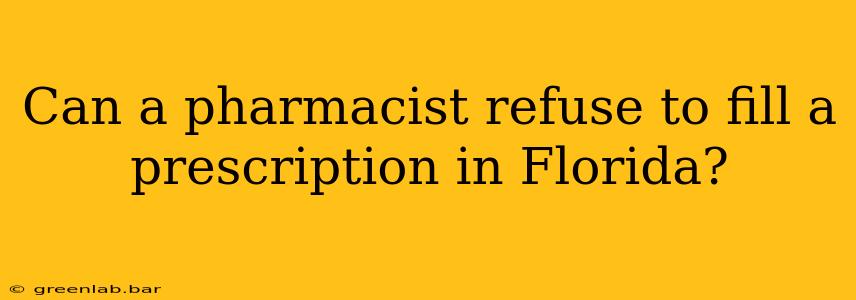Navigating the complex landscape of prescription medications can sometimes lead to unexpected hurdles. One such hurdle is the possibility of a pharmacist refusing to fill a legally valid prescription. In Florida, as in other states, this issue is governed by a delicate balance of professional ethics, legal rights, and patient access to necessary care. This article will explore the circumstances under which a Florida pharmacist might refuse to fill a prescription and the rights of patients in such situations.
When Can a Pharmacist Refuse to Fill a Prescription in Florida?
Florida law, along with professional standards of practice, allows pharmacists a degree of discretion in dispensing medications. However, this discretion is not absolute and is subject to significant limitations. A pharmacist cannot refuse to fill a prescription solely based on personal beliefs or objections to the medication or the patient's condition. Refusal must be based on legitimate professional concerns. These include:
1. Legitimate Safety Concerns:
- Potential for Adverse Drug Interactions: If a prescription presents a clear and significant risk of adverse drug interactions with other medications the patient is taking, the pharmacist has a duty to refuse the prescription until the issue is resolved with the prescribing physician. This safeguards patient safety.
- Incorrect Dosage or Instructions: If the prescription contains an obvious error in dosage, frequency, or instructions, the pharmacist should contact the prescribing physician for clarification before dispensing. Refusal is justified only after attempts to rectify the issue have failed.
- Patient Allergies or Contraindications: If the pharmacist has knowledge of a patient's allergy or contraindication to the prescribed medication, they are obligated to refuse the prescription to prevent potential harm. This necessitates maintaining accurate patient records and verifying allergies.
- Suspicious Prescription: If the pharmacist suspects the prescription is forged, altered, or otherwise invalid, they are legally obligated to report their suspicions to the authorities and refuse to fill the prescription. This is crucial in combating prescription drug abuse.
2. Lack of Information or Verification:
- Missing Information: If the prescription is incomplete or lacks necessary information (e.g., patient name, date of birth, physician's signature), the pharmacist can refuse to fill it until the information is provided. This is essential for accurate identification and record-keeping.
- Inability to Verify Prescription Legitimacy: Pharmacists utilize electronic systems to verify the validity of prescriptions. If the prescription cannot be verified through these systems, further investigation is needed before dispensing the medication.
3. Conscientious Objection (Limited Circumstances):
Florida law allows for a pharmacist to refuse to dispense medications that violate their deeply held moral or religious beliefs. However, this exception is extremely narrow and is subject to stringent requirements. The pharmacist must ensure that the patient has access to the medication through alternative means, such as referring them to another pharmacy. Furthermore, this exception does not apply to situations involving medications for life-threatening conditions.
What are a Patient's Rights if a Pharmacist Refuses to Fill a Prescription?
If a pharmacist refuses to fill your prescription, you have several options:
- Contact the Prescribing Physician: Discuss the situation with your physician. They can attempt to resolve the issue with the pharmacist or provide an alternative solution.
- Contact Another Pharmacy: Seek to fill the prescription at a different pharmacy.
- File a Complaint: If you believe the refusal was unjustified or discriminatory, you can file a complaint with the Florida Board of Pharmacy.
- Legal Action: In rare cases involving clear violations of patient rights, legal action may be an option.
Conclusion:
While pharmacists in Florida have some latitude in dispensing medications, their discretion is strictly limited by legal and ethical obligations. Patient safety and access to necessary medications remain paramount. Understanding the circumstances under which refusal may occur and the patient's rights are vital for navigating potential conflicts. If you experience a refusal to fill a prescription, it's essential to address the situation calmly and pursue available options to obtain the necessary medication. Remember, communication and collaboration are key to resolving such situations efficiently and safely.

